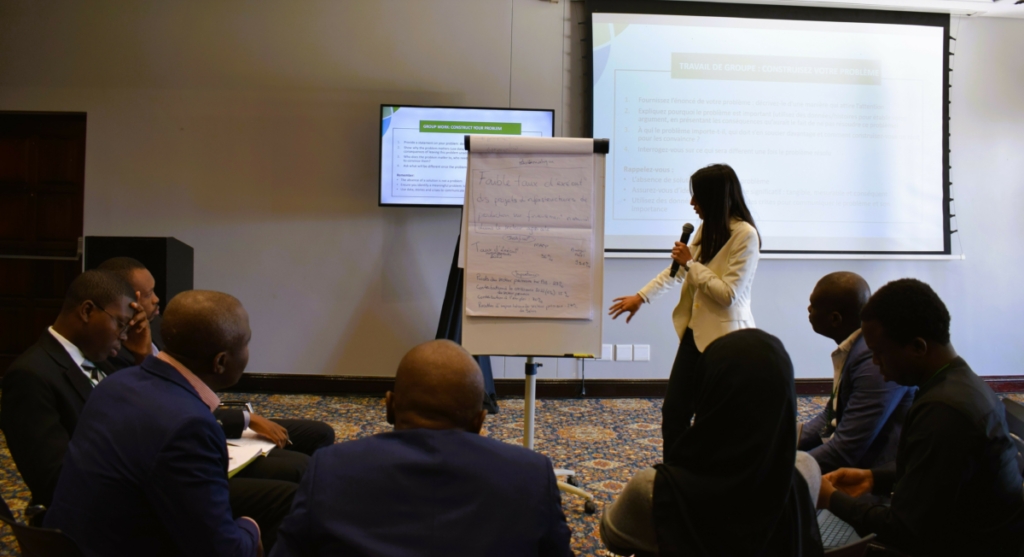
Joana Bento, Programme Manager for the BPFC programme at CABRI at the Building Public Finance Capabilities programme Framing Workshop 2023
Public investments have long been a policy challenge for many countries in Africa. These are important drivers of economic growth, job creation and infrastructure development. Despite increasing allocations and investment rates towards infrastructure over the past two decades, according to the World Bank statistics on infrastructure, countries in Sub-Saharan Africa (SSA) still lag the rest of the world in terms of electricity supply, paved road density, public education infrastructure, telecommunications infrastructure, and access to water.
This suggests that there are inefficiencies in the public investment management cycles of countries. And its public finance symptoms are multiple: low execution of capital spending, projects that consistently run into delays and cost overruns, accumulation of arrears – and that’s just the tip of the iceberg.
These are some of the problems that country-teams in the Building Public Finance Capabilities in Africa 2023 are tackling. At the core of the programme, is the Problem Driven Iterative Adaptation (PDIA) Approach which promotes a deep understanding of complex policy problems in order to develop solutions that are contextually relevant. This requires country-teams to uncover the various causes of the problem within the public investment chain, from the strategic planning process, to project conceptualization, appraisal and selection, to the implementation, monitoring and evaluation of those projects.
Country-teams like Lesotho for instance, have identified several weaknesses in the project conceptualization stage and linkages (or lack thereof) to the budget process - specifically, the coordinative and analytical capabilities required during project appraisal and evaluation to demonstrate their bankability and financial viability. Solving these issues is not as simple as improving the tools and methodologies for feasibility studies or impact evaluations but also determining the right profile of individuals who should be undertaking and evaluating them, the political commitment to a rigorous selection criteria and prioritisation, the timing of those processes to ensure strong linkages with the medium-term budget process, etc. Furthermore, the capacity of Public Investment Management units and the coordination mechanisms between these units and finance and planning departments is equally significant.
These problems are then further compounded during the execution stage, as identified by country- teams from Nigeria and Benin: delays in procurement processes and cash releases or weaknesses in monitoring and in-year reporting systems are some of the challenges that commonly emerge. As with budget planning, these are not just technical issues resulting from the absence of rules or processes but rather from the fact that the budget is inherently driven by people with their own incentive systems, capacities and motivations. For instance, procurement rules may very well be clear on paper, but it is in many cases, the multiple degrees of freedom in the manner that procurement agencies and line ministries engage each other that dictates whether procurement outcomes will be functional or not.
Solving these problems will therefore require more than just technical solutions. These are complex problems with deep rooted causes lying under its surface. And just like the Titanic, what sank the boat was not the visible part of the iceberg but the unobservable depths of ice underwater.
Over the course of the next two months, country-teams will continue their action-learning journey as they deepen stakeholder consultations to uncover the deeper root causes of these complex problems and propose and implement solutions through a collaborative process.
In March, teams will convene in Kigali, Rwanda, at a Progress Review Workshop, to report back on new learnings, on the solutions they have identified and experimented with, the corrective measures that may be required and set out new objectives for the upcoming months. The workshop will also facilitate a deep reflection on how country-teams within institutions will carry this work further by embedding a culture of iteration and adaption in solving complex public policy and finance problems.
Table 1: Problem statements and progress
| Country | Problem | Progress |
|---|---|---|
| Benin | Low execution levels of productive infrastructure projects in the agriculture sector financed through own resources | - The team started consulting stakeholders to determine the delays in operationalizing the budget, namely with regards to the approval of annual workplans. |
| - Undertook a survey to uncover training gaps in public procurement. | ||
| Guinea | Significant accumulation of internal arrears, which impact the implementation of public policies, penalizes service providers and taints the credibility of the State | - The team held several consultations with relevant stakeholders to determine the extent of arrears and identified the priority sectors for particularly within the energy sector who holds most of these arrears. |
| - The team is reevaluating budget forecasting techniques in order to ensure greater credibility and reliability of revenue forecasts. | ||
| Lesotho | Low access to clean and potable water due to poor water infrastructure | - The team consulted with the project cycle management unit to understand the various organizational structures that provide input into the project appraisal process and unpack the challenges. |
| - The team is in the process of engaging the planning officers to access capacity building needs and gaps. | ||
| Nigeria | Despite incessant government borrowing and increased spending in social sectors, capital expenditures have not met the expected outcomes | - The team is engaging relevant ministries to gather relevant data related to the implementation of projects in health and education and identify gaps. |